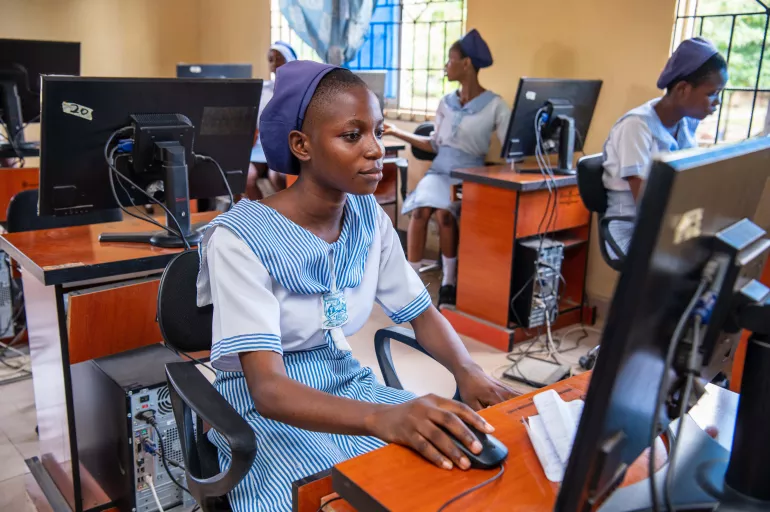By Isaac Atunlute
Interventions have been made to digitise Nigeria’s school system and the federal and state governments are investing heavily in smart classrooms, internet learning platforms, and digital learning materials.
One major challenge threatening the efforts is that a significant share of teachers remain digitally illiterate.
In 2023, the Universal Basic Education Commission (UBEC) reported that over 60% of teachers in Nigerian schools lack basic digital skills. This skill gap means that even where infrastructure–laptops, projectors, and internet connectivity–is available, it is underutilized in classrooms.
The case is particularly acute in rural and semi-rural localities like Kuje Area Council in Abuja, where digitalisation is yet to take hold.
In education, teachers in most schools continue to use chalkboards, written lesson notes and face-to-face interactions with limited opportunity to expose pupils to digital experience.
The problem now isn’t just access to devices but rather the ability and willingness of educators to use digital tools in their teaching. Many teachers were trained in traditional methods and have received little or no digital training. As a result, devices provided under federal or state initiatives therefore sit in closets or are underused for fear of misuse or lack of self-efficacy.
Such analog thinking is a distraction from the broader goals of the national digital education strategy of improving student participation, taking learning beyond the classroom, and preparing people to compete in a digital economy.
To address this, both governments and non-governmental organisations have begun providing teacher-focused digital training programmes.
The EKOEXCEL program in Lagos State equipped public school teachers with the use of digital tablets to teach, monitor progress, and access centralized curriculum material. It was said to enhance the learning achievements of the students and the teachers’ performances.
Edo State’s initiative EdoBEST offers assistance, with a clear emphasis on classroom management and digital education, supporting teachers through ongoing professional development and mentoring towards being well-skilled and self-assured in the utilization of technology.
NGOs like the TEP centre and Coderina have organized practical workshops in undeveloped regions for teachers. Activities are focused on practical skill-building, such as interactive board implementation, usage of learning platforms, and designing digital lesson plans. Through such training, over 10,000 teachers in the country have benefited.
In FCT, various local initiatives with the support of education NGOs have set up junior secondary school teacher pilot programs. These include weekend ICT camps, in-school mentoring, and partnerships with local tech hubs that provide ongoing assistance.
Despite challenges like unstable power supply and poor connectivity, change is underway. Teachers who once avoided technology are now beginning to adopt basic digital tools in the classroom, often with the encouragement of peer groups and institutional backing.
Long-term sustainability will mean ongoing investment in teachers’ training, particularly in the rural and peri-urban settings. Digital practice must be co-developed with teachers, considering the teacher’s key role in mediating students’ experience of technology in education.
Ultimately, digital literacy of teachers is not an afterthought but an integral part of having equitable, modern, and successful education in Nigeria.
Nigeria's educational system aims to digitize through initiatives like smart classrooms and digital learning platforms, but a significant issue is the lack of digital literacy among teachers. Despite infrastructure investments, over 60% of teachers lack basic digital skills, especially in rural areas where traditional chalkboard methods prevail. The challenge is less about lack of resources and more about teachers' unwillingness or inability to use technology due to their training in conventional methods and the absence of digital training.
To bridge this gap, various programs are offering digital training for teachers. For instance, Lagos State's EKOEXCEL program equips teachers with digital tablets for teaching and accessing curriculum materials, enhancing both teaching and student learning outcomes. EdoBEST in Edo State focuses on digital education and professional development, while organizations like TEP Centre and Coderina provide workshops for hands-on digital skill building in underserved regions. Such efforts have benefited over 10,000 teachers, encouraging gradual adoption of technology in education.
Despite obstacles like unstable power and connectivity, progress is evident with teachers starting to use digital tools, supported by peer groups and institutional encouragement. However, sustainable progress relies on continued investment in teacher training, particularly in rural areas, and integrating digital practices into education alongside teachers, emphasizing their role in guiding students' technological learning. Teacher digital literacy is essential for fostering equitable and modern education in Nigeria.






